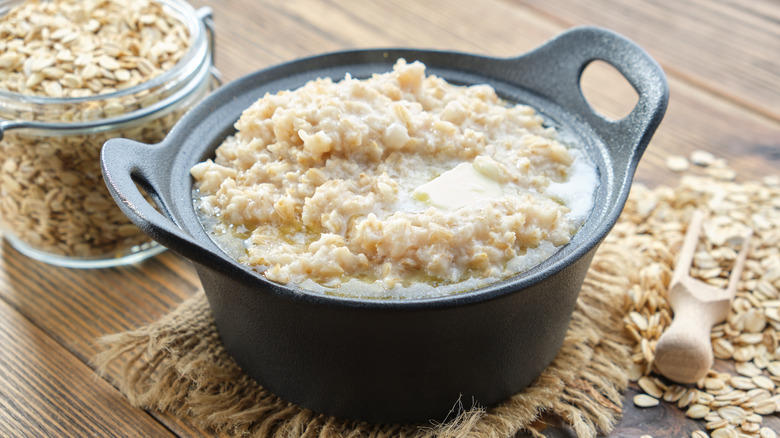What Is The Oatmeal Diet?
Most restrictive diets focus on cutting out one macronutrient like carbs or fat. Others, like the oatmeal diet, cut out everything but a handful of foods. In the case of the oatmeal diet that one food is, well, oatmeal. A few other foods are allowed but it is, at its core, an ultra-restrictive diet.
Following the oatmeal has two phases (according to Healthline). Phase one is a week where the main course at every meal is oatmeal (specifically, non-instant rolled oats). Fresh fruit or raw veggies can be added on the side and spices are allowed for flavor. Fruit or veggies also serve as afternoon snacks between lunch and dinner.
After a week the diet opens up. Oatmeal is only served twice a day while the third meal is up to the dieter's choice, so long as it is low-fat. Dairy is also allowed, though again it has to be low-fat.
Noom, a New York based startup focused on health and wellness, offers a third phase that eases people back into a broader spectrum of foods. In this phase oatmeal becomes an occasional food rather than one eaten every day. Calorie-heavy foods are still off-limits, however. All meals must be low-calorie and nutrient dense, which means a heavy emphasis on produce and protein with limited fat or starchy carbs.
Too much of a good thing
Oatmeal is actually very good for you. The American Heart Association recommends three servings of fiber-heavy grains a day and oatmeal is specifically mentioned in a list they provide. A half cup of oats has two grams of fiber, three grams of protein, 6% of your daily iron needs, and 2% of your daily calcium. With only one-and-a-half grams of fat and no sugar, oats definitely fall into the "healthy food" category.
When used as the main food staple, however, they're too calorie restrictive. The Academy of Nutrition and Dietetics warns against low-calorie diets, specifically those with super-low calorie limits. These diets slow your metabolism, cause mental fog, and deprive you of essential nutrients — not to mention the increased risk of gallstones. So while the oatmeal diet will definitely help you shed pounds, it doesn't deliver on that promise safely. Most sites push the diet's claim that you can drop 10 pounds in a week, which is five to 10 times higher than the CDC's safe weekly weight loss limit of one to two pounds a week.
Crash diets are rarely worth the risks. Or the weight gain you face when you stop following the diet plan. You're better off going for small lifestyle changes that add up over time. They lead to sustained weight loss that you can maintain, with or without oatmeal.


